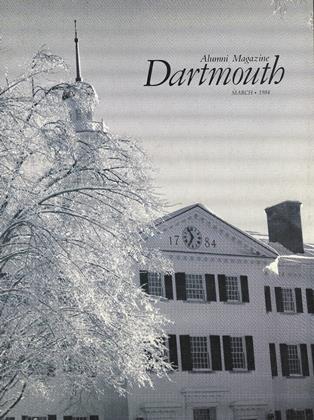On February 6, the faculty convened in an open meeting to discuss the return of NROTC to the campus and to vote on a motion presented by its executive committee, namely that "the Faculty of Arts and Sciences recommends that the Trustees of Dartmouth College not seek re-establishment of an NROTC unit at the College." One hundred and seventy-seven faculty two thirds of those on campus and about 100 observers listened first to Kevin Rosen 'B4 add what he called "something new and important" to a very familiar issue on campus. He spoke about the report of the committee on Organization and Policy (COP), on which the non-reinstatement motion was based, calling it "outrageous" and poorly researched. Rosen felt students ought to have the option of the scholarships such a program would provide (a matter of $200,000 or $400,000, depending on whose figures you use).
Professor Mary Kelley, who currently chairs the ten-member COP, then outlined the reasoning behind its report. She spoke of reservations about the enrollment pattern that the Navy program would require: seven consecutive terms bracketed by cruises, with three of those seven terms involving a course overload. (No other Dartmouth College program requires such an extended and intensive schedule.) The committee had objections also to the automatic appointment of Navy personnel to the faculty (even on a non-voting basis) and to the inclusion in Dartmouth's curriculum of naval science courses that, unlike all other courses taught at the College, would not be subject to approval by the Committee on Instruction or by the divisional councils of the institution.
The net gain in financial aid, reported Kelley, was felt not to be significant in the context of Dartmouth's $7-million scholarship program. The COP also found no reason to believe the program would contribute significantly to the diversity of the student body. However, said Kelley, the committee wished unanimously to go on record in support of the armed forces as an honorable choice for graduates of Dartmough College. "Not having ROTC on campus," she explained, "does not preclude a naval career for Dartmouth students, who are equally able to bring to bear on the military a liberal arts perspective after graduation." The summary conclusion of the report from the COP was that the effect of inviting the Navy back to Dartmouth would be to undermine, not to enrich the College's liberal arts education.
Debate, while not as hot as many expected, was warm, given that those recognized by President McLaughlin spoke roughly half-and-half for and against the motion. The final vote was 153 in favor of the motion opposing the reinstitution of NROTC and 22 against it, with two abstentions.
 View Full Issue
View Full Issue
More From This Issue
-
 Feature
FeatureBraving the Alps
March 1984 By Jack Aley '66 -
 Feature
FeatureShaping Public Policy: The Washington Internship Program
March 1984 By Frank Smallwood '51 -
 Cover Story
Cover StoryA New in the Neighborhood
March 1984 By Debbie Schupack '84 -
 Feature
FeatureThose Championship Seasons
March 1984 By Brad Hills '65 -
 Article
ArticleThe Price of Art
March 1984 By Monica Louise Latini '84 -
 Class Notes
Class Notes1963
March 1984 By Harry R. Zlokower







